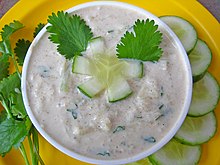Raita
 Cucumber and mint raita | |
| Alternative names | रायता, রায়তা Pachadi |
|---|---|
| Course | Condiment |
| Region or state | Indian subcontinent with regional variations |
| Associated cuisine | India, Bangladesh, Pakistan, Nepal |
| Serving temperature | Cold |
| Main ingredients | Dahi (yogurt), buttermilk, cucumber, mint |
| Variations | Dahi chutney, Pachadi |
| 46 kcal (193 kJ) | |
Raita is a side dish in Indian cuisine made of dahi (yogurt, often referred to as curd) together with raw or cooked vegetables, fruit, or in the case of boondi raita, with fried droplets of batter made from besan (chickpea flour, generally labeled as gram flour).
The closest approximation in Western cuisine is a side dish or dip, or a cooked salad. It is often referred to as a condiment, but unlike common Western condiments such as pepper, mustard, and horseradish that make dishes more spicy, a dish of dahi or raita has a cooling effect to contrast with spicy curries and kebabs that are the main fare of some Asian cuisines. In Indian cuisine, some type of flatbread may be eaten together with raita, chutneys, and pickles.
The yogurt may be seasoned with coriander, roasted cumin seeds, mint, cayenne pepper, chaat masala and other herbs and spices.
Etymology
[edit]The word raita first appeared in print around the 19th century; it comes from the Hindi language.[1] The word raita in Bengali and Hindi is a portmanteau of the Sanskrit word rajika or the derivative Hindi rai (pronounced "ra-ee") meaning black mustard seed, and tiktaka, meaning sharp or pungent.[2]
In South India, especially Andhra Pradesh, Telangana, Kerala and Tamil Nadu, traditional raita is called pachadi,[3] In Telugu it is referred to as Perugu pachadi, and Tayir pachadi in Tamil.
In Eastern Nepal, the dish is known as dahi kakro (lit. 'yogurt cucumber'), whereas in western regions of Nepal it is known as raito.[4][5]
Raita is also sometimes simply called dahi, or "sourmilk", after its main ingredient, particularly in South African Indian cuisine.[citation needed]
Preparation
[edit]Cumin (zīrā) and black mustard (rāī ) are fried. This tempering is then mixed with minced, raw vegetables or fruits (such as Cucumber, Onion, Carrot, Beetroot, Tomato, Pineapple, Pomegranate) with yogurt.[6]
Raw ginger and garlic paste, green chili paste, and sometimes mustard paste are used to enrich flavour.[citation needed]
Raitha is usually served chilled. It is used to cool the palate when eating spicy Indian dishes.[7]
Variants
[edit]-
Onion raita
-
Spring onion raita
-
Boondi raita
-
Beetroot and carrot raita
-
Boondi raita
Raitas can be prepared with three main base ingredients: vegetables, pulses and fruits. These are mixed with yogurt and flavoured with a variety of seasonings to make different types of raita.[8]
Vegetable raitas
[edit]
- Bathua ka raita, popular in Haryana in winters[9]
- Cucumber raita
- Lauki (bottle gourd/calabash) raita, popular in Haryana and Uttar Pradesh
- Beetroot raita
- Brinjal raita
- Carrot raita
- Chili salt raita, either with chopped fresh chilies or dried chili powder
- Horned melon raita
- Mint and peanut raita
- Onion coriander spring onion raita
- Onion tomato raita
- Potato raita
- Pumpkin raita
- Spinach raita
- Garlic mint raita
Fruit raitas
[edit]
- Banana raita
- Mango raita
- Guava raita
- Grape raita
- Pineapple raita
- Pomegranate raita
- Pear raita
Pulse raitas
[edit]Made either from sprouted pulses, roasted pulses or other condiments made from pulse flour.
- Bhujia sev raita
- Boondi raita
- Sprouted green gram raita
Serving methods
[edit]As a side dish
[edit]
Raita is served as a side dish to be eaten with main course dishes.[8]
- Biryani
- Pulav (pilaf)
- Seekh kabab
- Paratha
- Pav bhaji
- Indian Thali
As a sauce
[edit]- Grilled chicken
- Salmon
- Tacos
As a dressing
[edit]- Salads
- Pasta salad
See also
[edit]- Tzatziki, a similar dish found in Eastern Mediterranean and Middle Eastern cuisine
- Pachadi, a South Indian pickle side dish similar to Raita
- Chukauni, a Nepalese potato side dish
- Lists
References
[edit]- ^ Sedgwick, Fred (2009). Where words come from: A dictionary of word origins. London: Continuum International Publishing group. ISBN 9781847062741.
- ^ "Raita". Merriam Webster.
- ^ "How To Make South-Indian-Style Tomato Raita". NDTV Food. Retrieved 11 October 2022.
- ^ "स्थानीय उत्पादनको प्रवद्र्धन : पाहुनालाई घिउ, मह र मकैको रोटी". Naya Patrika (in Nepali). Retrieved 27 August 2022.
- ^ "सुदूरको स्याउली थाप्ने चलन लोप हुँदै". प्रशासन (in Nepali). Retrieved 27 August 2022.
साइतमा जानेहरूका लागि स्याउली थाप्ने चलन, साउन महिनामा धानको खेतबारीमा गएर राइतो, बटुक बनाएर हरेला खाने चलन
- ^ Mehta Gambhir, Aloka (25 May 2011). "Tandoori chicken with Tomato Raita". The Times of India. Retrieved 22 December 2019.
- ^ American Dietetic Association (2009). Cultural Food Practices. American Dietetic Associat. p. 244. ISBN 9780880914338.
- ^ a b Basic Food Preparation (Third ed.). Orient Longman Private limited. 1986. ISBN 81-250-2300-3.
- ^ Bathua ka Raita | Haryana and Archived 12 November 2020 at the Wayback MachineUttar Pradesh bathua recipe | Indian cuisine, masterchefu.com.






